Stress in SEO: How salary, work setup, location, and seniority impact your work-life balance
What makes some SEO professionals thrive while others burn out? Is it the job title, the company, the paycheck, or even the country they live in?
To answer these questions, we surveyed SEO specialists worldwide and analyzed job market data. What we found paints an interesting (and at times unexpected) picture of what life is really like for SEO specialists.
-
Salary significantly impacts SEO job satisfaction.
SEOs earning higher salaries generally report greater satisfaction, with those making over $200,000 being the happiest.
-
Stress levels among SEOs vary depending on where they work.
In-house SEO specialists report the lowest stress (3/5), whereas agency roles experience the highest (3.4/5).
-
Location matters for SEO job satisfaction and stress.
Among SEOs, job satisfaction peaks in the US at 3.62/5, while those in the UK & Ireland see the highest levels of pressure.
-
Advancing in SEO seniority usually leads to higher job satisfaction.
Junior SEOs face the lowest levels of job satisfaction, averaging just 2.88 out of 5. In contrast, Heads of SEO enjoy significantly higher satisfaction at 3.41 out of 5.
-
Working hours alone don’t determine job satisfaction for SEOs.
Longer hours often coincide with higher job satisfaction, often due to increased earnings. Yet, according to SEOs, the optimal balance appears to be in the range of 20–34 per week, which offers flexibility without sacrificing stability or career growth.
-
Each SEO work setup comes with its own impact on stress and satisfaction.
In-house roles provide stability and lower stress, agency positions offer rapid skill growth but higher pressure, and freelancing delivers freedom and the highest satisfaction (but requires managing income volatility). Choosing the right setup depends on individual priorities.
SEO job market overview
Before we talk about stress and job satisfaction, let’s take a quick look at what the SEO job market looks like right now.
Over the past year, the market has been recalibrating. In 2024, SEO job listings dropped by about 30% in the U.S., UK, and Australia. This decline was not just because of tech layoffs, but because priorities changed. Employers have started to seek SEOs who combine technical expertise with creative, data-driven thinking, and (what’s extremely important) who know how to use AI tools in a smart way.
But as of mid-2025, things are starting to pick up again, especially for SEO specialists with technical or senior-level skills.
This year’s job openings reflect this shift:
- 14% of SEO jobs are for junior roles
- 59% are mid-level
- 27% are senior or leadership positions
This shows that most employers are looking for experienced professionals who can work independently, lead projects, and drive results. Even though junior roles still exist, they make up a relatively small share of the market in 2025.
Another trend is the split between in-house and agency work. One 2025 SEO jobs analysis of 10,000+ SEO job listings shows that:
- 65% of open SEO roles are in-house positions, where specialists work directly for a single company.
- 35% are agency-based, supporting multiple clients across industries.
A large share of SEOs prefer working in-house, and one clear reason for that is compensation. Our 2025 SEO salary survey found that in-house roles consistently offer higher median salaries than agency roles:
- Startups and in-house SEO teams reported median salaries ranging from $53,100 to $61,329
- Digital marketing agencies reported the lowest median salary, at $50,000
Beyond pay, in-house employees often receive benefits like health coverage, retirement plans, and flexible work options. Agencies, by contrast, tend to emphasize performance bonuses and client variety. This may be appealing to some, but also linked to higher stress.
Responsibilities & daily work of SEOs
While core SEO principles remain consistent, the daily experience of SEO specialists varies significantly depending on whether they work in-house or at an agency.
- In-house SEOs focus entirely on one brand. They lead the overall SEO strategy, work closely with internal teams like product, content, and development, and take responsibility for technical SEO and performance tracking. They often have more manageable workloads and better-defined working hours.
- Agency SEOs work with multiple clients, often across a variety of industries. Their priority is delivering results within each client’s specific goals, timelines, and budgets. This often explains why they are also more likely to experience client-driven stress cycles and high project turnover.
Now, let’s take a look at other findings from our SEO survey.
Does a higher SEO salary improve your job satisfaction?
It’s no surprise that money plays a central role in how satisfied SEO professionals feel at work. Our survey shows a clear correlation between higher salaries and greater job satisfaction, though not a perfectly straight line.
- Professionals earning under $30,000 report the lowest satisfaction.
- Satisfaction improves steadily beginning at the $50k–$75k range (3.49), and peaks between $100k and $150k (3.79).
The most satisfied group is those earning over $200,000, with a satisfaction score of 4.14, and an average salary of $379,971.
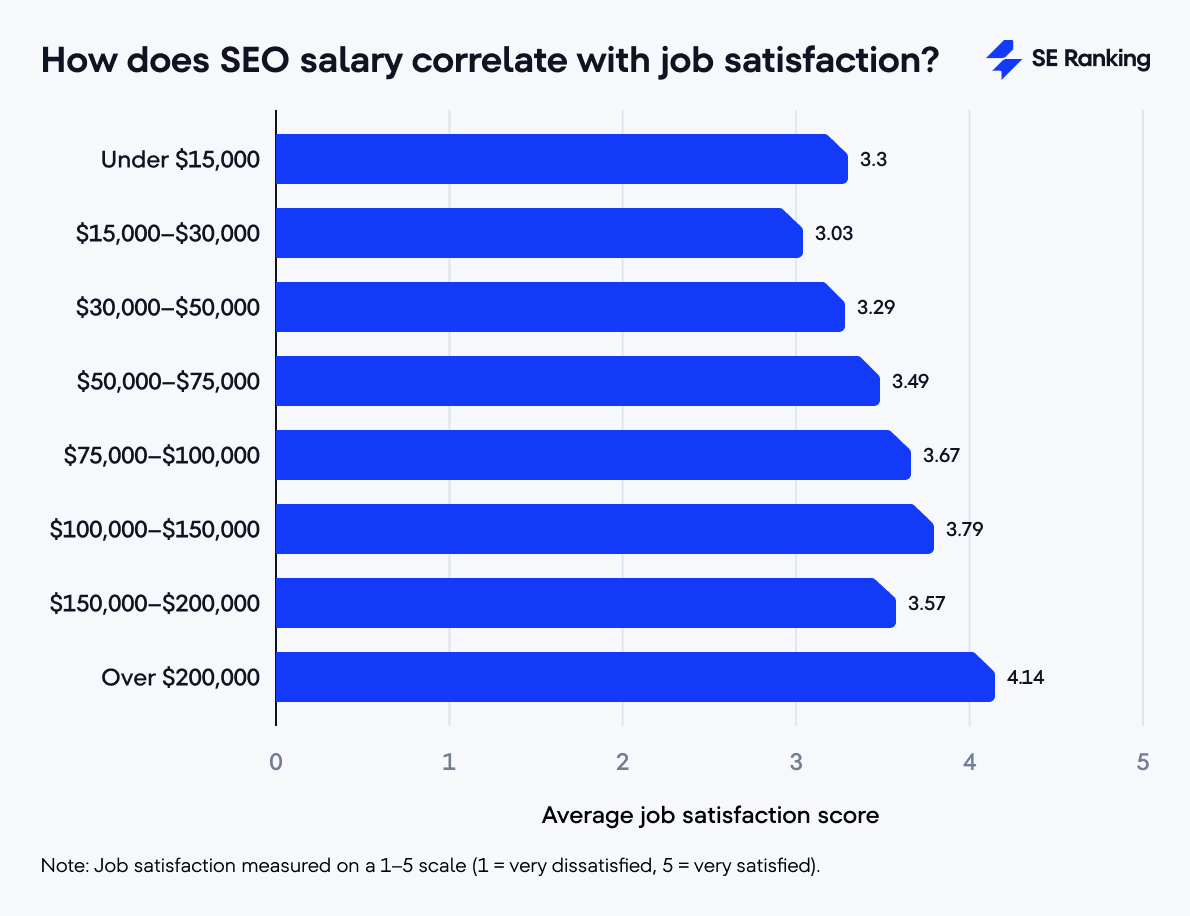
Interestingly, there’s a slight dip in the $150k–$200k bracket (3.57), suggesting that beyond a certain point, other factors may impact happiness more than money alone.
And in many cases, the work setup becomes the determining factor.
What type of SEO workplace leads to higher job satisfaction: Freelance, agency, or in-house?
The workplace setup turns out to be just as influential as salary.
While many assume in-house specialists or agency employees would report the highest satisfaction, the real winners are freelancers, with an average satisfaction score of 3.75 out of 5. This is likely due to greater autonomy and the flexibility that comes with being their own boss.
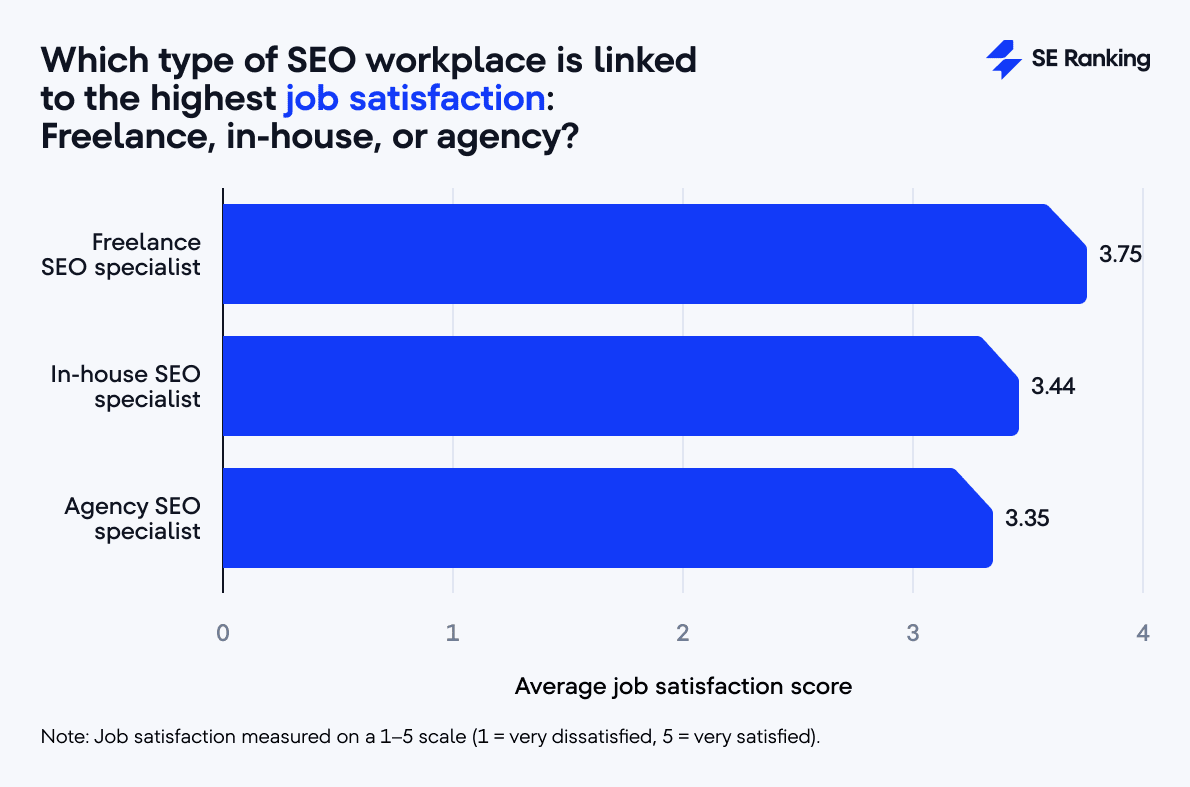
In contrast, digital marketing agency employees reported the lowest satisfaction (3.35) and the highest stress levels (3.4). This tough combo might be linked to demanding client expectations and fast-paced workloads.
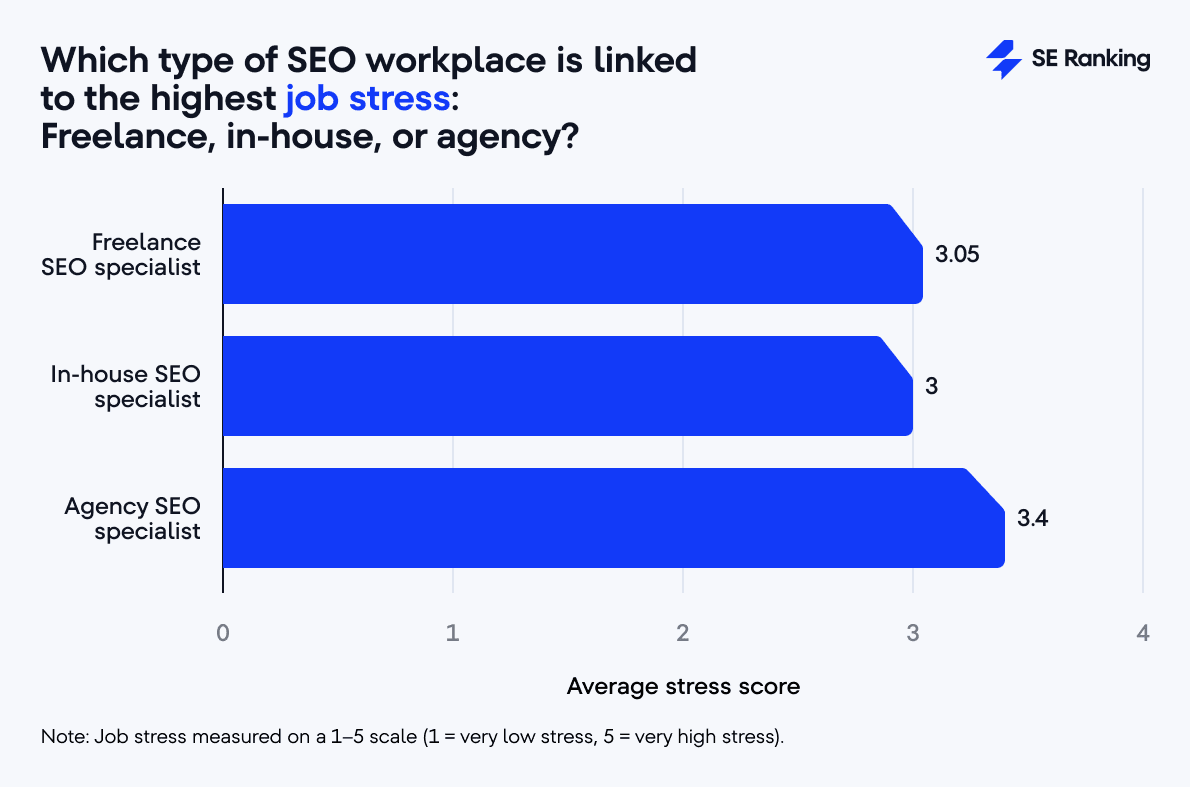
Meanwhile, in-house SEO departments offer a more balanced experience with moderate satisfaction (3.44) and the lowest stress levels (3.0) overall.
In practice, seeking a work environment that pushes you just enough can make stress feel productive rather than overwhelming. This idea is echoed by Nuala Turner, editor at the Digital Project Manager.

Which countries offer the best work-life balance for SEOs?
Geography plays a bigger role in work-life balance than you might expect.
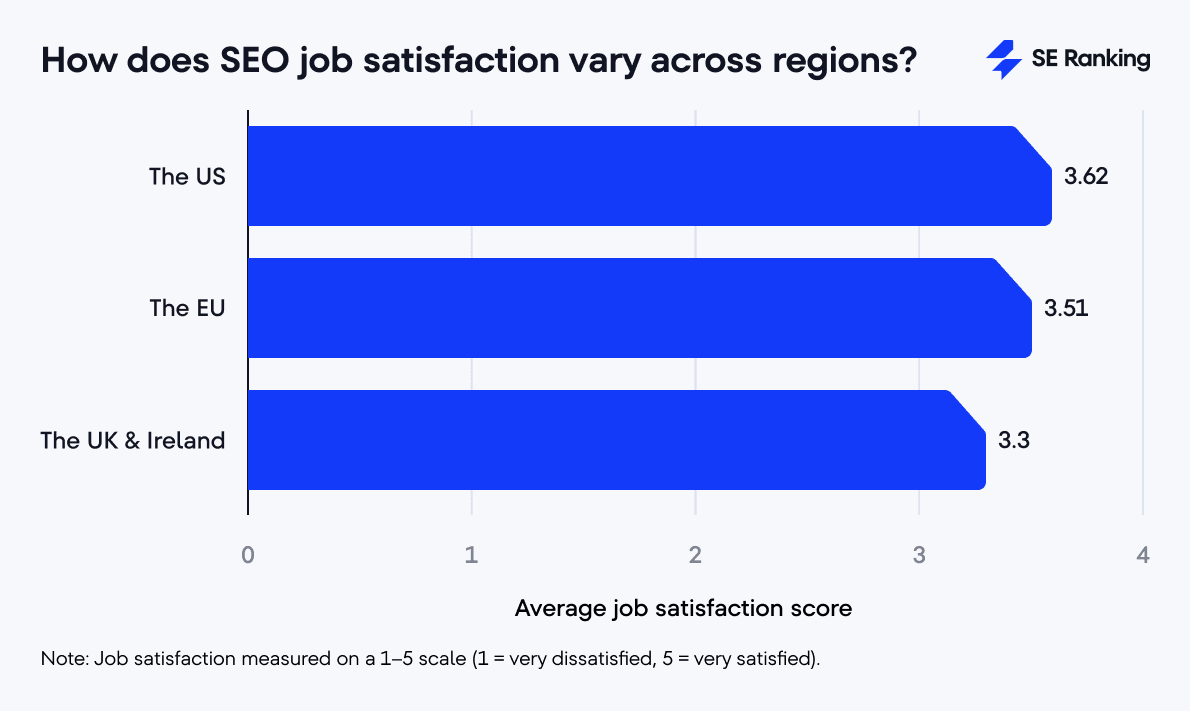
- In the US, SEO specialists report the highest job satisfaction (3.62 out of 5) and one of the lowest stress levels (3.03), suggesting a relatively healthy work environment.
- In the EU, professionals also enjoy high satisfaction scores (3.51) with moderate stress (3.1), indicating a generally balanced experience, though slightly more pressure than in the US.
- The UK & Ireland, however, present a different picture. SEO professionals there report lower satisfaction (3.3) and the highest stress levels among the three regions (3.3). This points to potentially tougher work conditions or higher expectations within this job market.
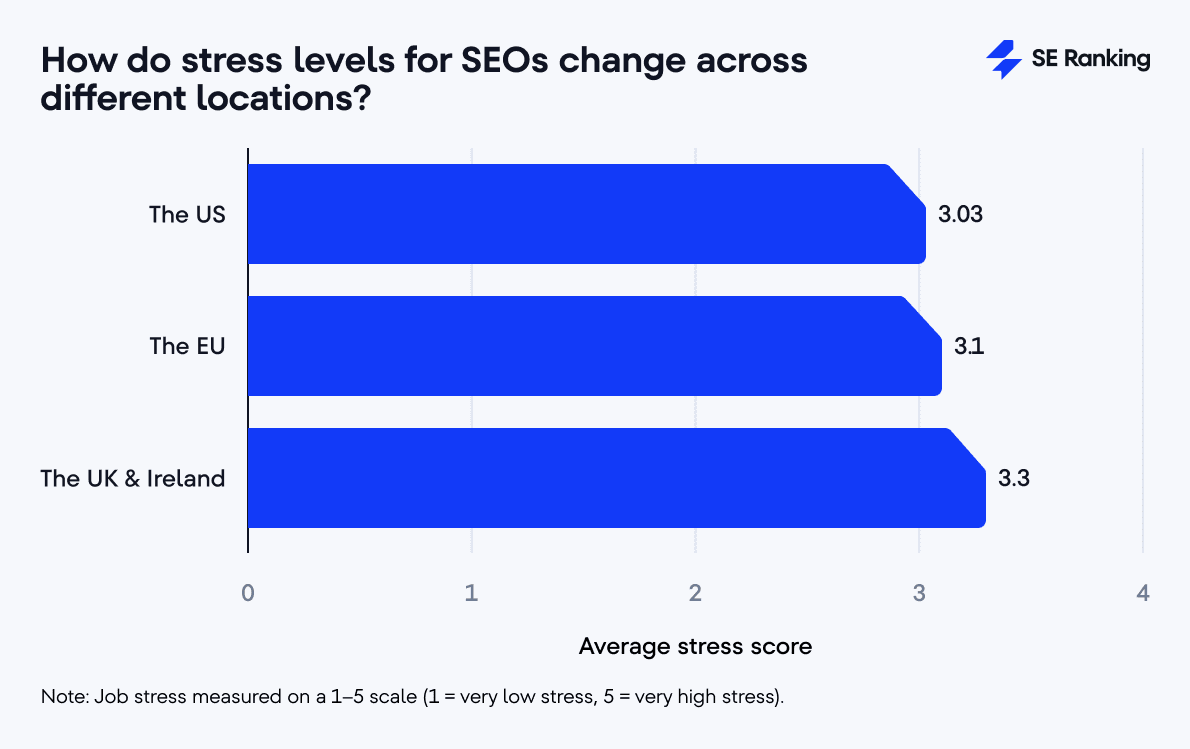
Overall, our findings show that cultural expectations, labor laws, and market maturity can significantly shape the SEO work experience (even for professionals in similar roles).
How does advancing in SEO seniority affect job stress and satisfaction?
Climbing the career ladder usually does come with more satisfaction:
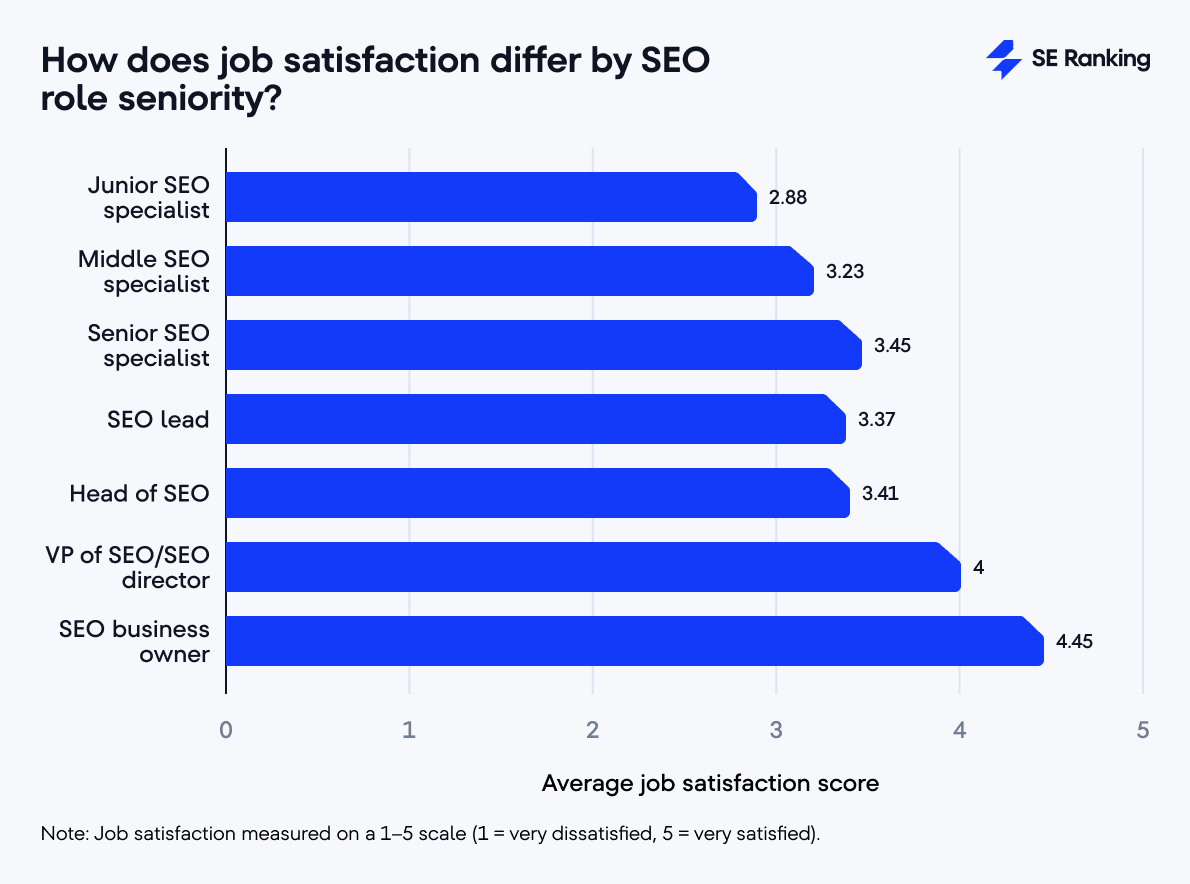
- Junior SEO specialists report the lowest job satisfaction at 2.88, which likely reflects early-career challenges.
- For middle & senior SEOs, job satisfaction rises to 3.23–3.45 as experience and responsibility increase.
- SEO Leads & Heads of SEO experience stable job satisfaction at 3.37–3.41.
- When it comes to VP of SEO/SEO Director, their job satisfaction jumps to 4 out of 5, which shows the positive impact of executive-level autonomy, strategic influence, and the ability to shape company-wide SEO initiatives.
- SEO business owners report the highest job satisfaction at 4.45. This highlights the benefits of ownership and control.
Advancing in SEO often boosts satisfaction, but senior roles also carry new pressures. As Franziska Schneider, Head of Marketing at nilo.health, explains:

Do longer working hours always mean less job satisfaction?
Finally, let’s look at hours worked. Many assume long hours lead to dissatisfaction, but the data tells a more nuanced story.
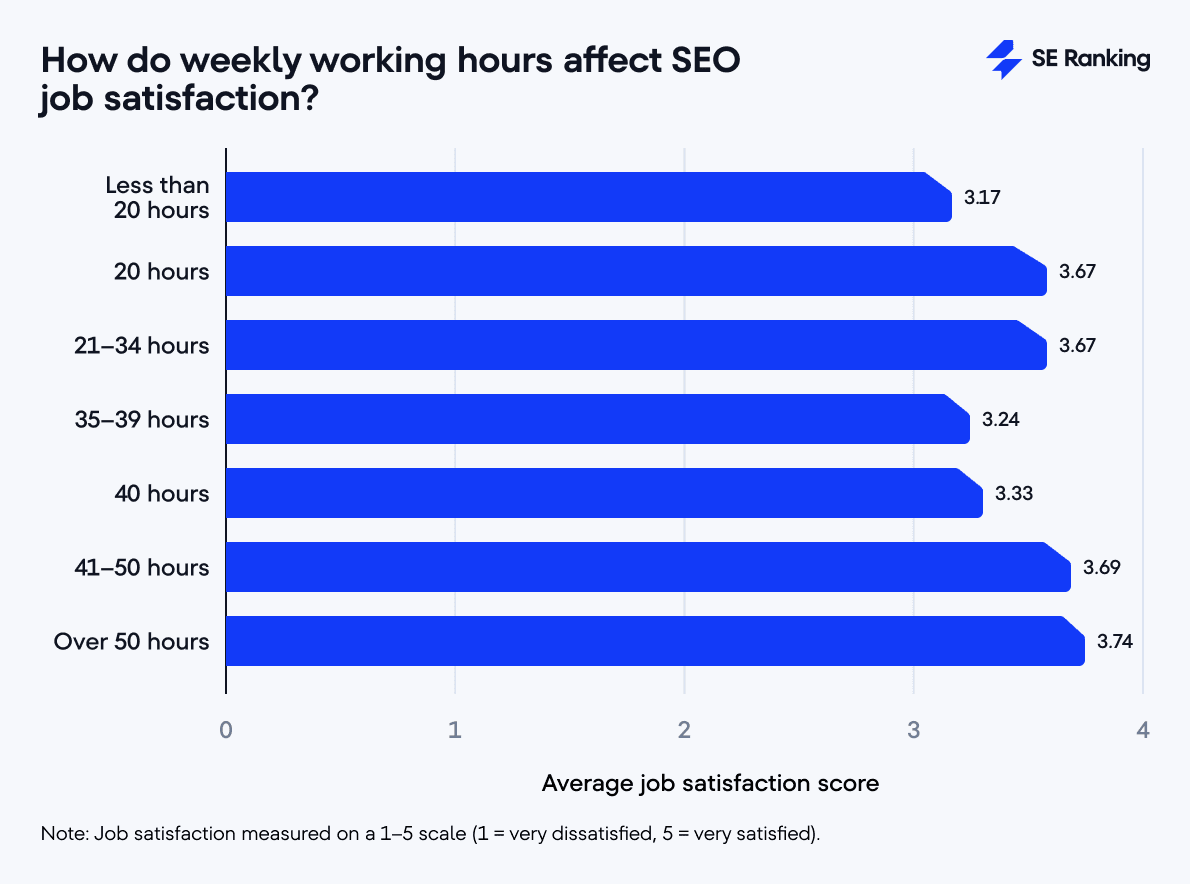
- SEOs working 50+ hours per week report among the highest satisfaction (3.74), likely because extended hours often come with higher earnings or senior roles.
- Those working under 20 hours are the least satisfied (3.17), possibly due to unstable income or lack of professional momentum.
- The sweet spot appears to be 20–34 hours per week, where satisfaction levels (3.67) remain high while still allowing flexibility and balance.
In other words, satisfaction isn’t simply about working more or less. It’s about whether the hours align with financial stability and personal goals.
Brief methodology overview
This analysis of SEO stress and job satisfaction is based on 279 survey responses from professionals across different regions, experience levels, and work setups. The goal was to identify trends in job satisfaction, stress levels, and the factors influencing them in 2025.
For regional comparisons, only areas with a sufficient number of responses were analyzed in detail: the United States, the European Union (EU), and the United Kingdom & Ireland.
Note: While the sample size of 279 respondents is relatively modest, we believe it provides meaningful insights into SEO professionals’ stress levels, satisfaction, and the work conditions shaping their day-to-day experience.
Conclusion
As our findings reveal, SEO stress and satisfaction are shaped by more than just the job title. They’re influenced by company type, salary, experience level, hours worked, and geography.
- In-house roles generally offer lower stress, better balance, and solid long-term satisfaction.
- Agency roles can build skills quickly and offer variety, but often come with higher pressure and workload volatility.
- Freelancers and business owners report the highest satisfaction, but must self-manage stress and income fluctuations.
Ultimately, the happiest SEOs are those who align their work environment, career path, and lifestyle with what matters most to them—whether that’s money, freedom, stability, or ownership.

